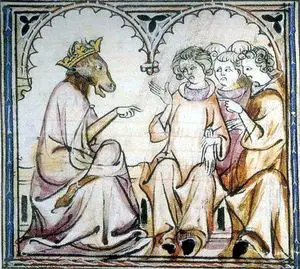To curry favour is to attempt to gain benefit or ingratiate oneself, by officious courtesy or flattery.
Curry favour
What's the meaning of the phrase 'Curry favour'?
What's the origin of the phrase 'Curry favour'? – the quick version
The expression ‘curry favour’ derives from the currying (that is, curry-combing, not cooking) of a mythical French horse called Fauvel.
What's the origin of the phrase 'Curry favour'? – the full story
In August 2007, the BBC ran a series of programmes to mark the 60th anniversary of the Partition of India. Given the popularity of Indian food in the UK they included several cookery programmes and I heard the ‘curry flavour’ pun three times in the first two programmes.
On looking into the source of the ‘curry favour’ phrase (curry source? – now they’ve got me at it) it appears that it isn’t original at all, but is itself a mishearing of another phrase.
To disentangle ‘curry favour’, or as the Americans prefer it spelled, ‘curry favor’, we need to look at ‘curry’ and ‘favour’ separately.
The word curry, as denoting the spicy food, comes from the Indian words ‘kari’ or ‘karil’ and was known in the English-speaking world by the late 16th century. A translation of Van Linschoten’s His Discours of Voyages into ye Easte & West Indies, 1598, records that:
“Most of their fish is eaten with rice, which they seeth in broth, which they put upon the rice, and is somewhat soure… but it tasteth well, and is called Carriel.”
To no great surprise, the curry of ‘curry favour’ has nothing to do with Indian food. It comes instead from an Old French verb conraier – ‘to prepare’, ‘to put in order’. This is the same source as the name for the rubbing down and dressing of horses – curry-combing.
‘Curry favour’ comes down to us becuse of a mishearing of the second word. This was originally not ‘favour’ but ‘favel’. John Palsgrave’s Lesclarcissement de la langue françoyse [The clarification of the French language], 1530, records a curryfavell as ‘a flatterar’.
Favel comes from the 1310 poem by the French royal clerk Gervais du Bus – Roman de Fauvel [The Romance of Fauvel].
That morality tale relates the story of Fauvel, an ambitious and vain horse, who deceives and corrupts the greedy leaders of church and state. The name Fauvel or Favvel, which is formed from ‘fau-vel’ (in English ‘veiled lie’), is an acrostic made from the initial letters of a version of the seven deadly sins: flaterie (flattery/pride), avarice (greed/gluttony), vilanie (wrath), variété (inconstancy), envie (envy), and lacheté (cowardice).
In the poem, the rich and powerful humiliate themselves by bowing down and stroking the coat of the false leader, that is, by ‘currying Fauvel’.
The first citation of ‘curry favour’ rather than ‘curry Fauvel’ comes in Alexander Barclay’s, The mirrour of good manners, circa 1510:
“Flatter not as do some, With none curry fauour.”
The history of “Curry favour” in printed materials
Trend of curry favour in printed material over time
Related phrases and meanings
Browse more Phrases
About the Author

Phrases & Meanings
A-Z
A B C D E F G H I J K L M N O P Q R S T UV W XYZ
Categories
American Animals Australian Bible Body Colour Conflict Death Devil Dogs Emotions Euphemism Family Fashion Food French Horses ‘Jack’ Luck Money Military Music Names Nature Nautical Numbers Politics Religion Shakespeare Stupidity Entertainment Weather Women Work
How did we do?
Have you spotted something that needs updated on this page? We review all feedback we receive to ensure that we provide the most accurate and up to date information on phrases.
